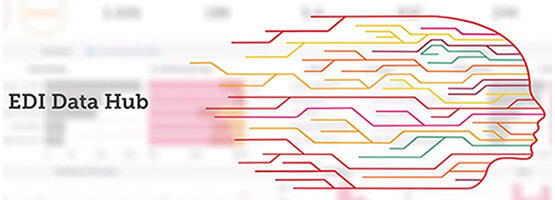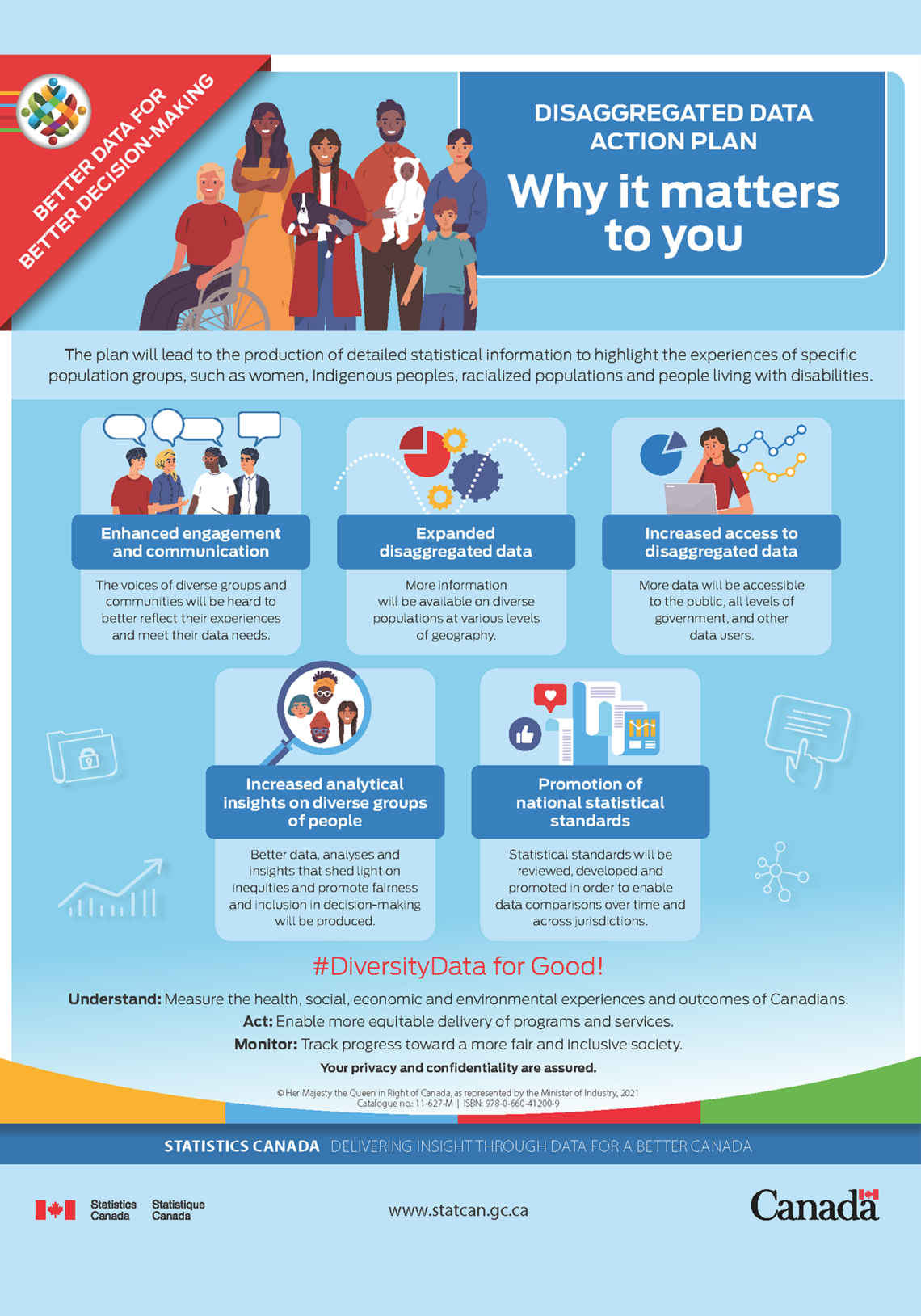The University of Calgary’s Equity, Diversity, and Inclusion (EDI) Data Operating Standard aims to set a clear and consistent framework for collecting, using, and disclosing EDI Data (outside of ethics-approved studies). This framework will be mandatory to follow for all units/faculties as of March 2024.
The collection of Equity Diversity and Inclusion (“EDI”) Data (defined in the Operating Standard) is necessary to assist the University of Calgary (“UCalgary”) to meet its EDI and accessibility objectives.
It is important to recognize that EDI Data includes sensitive personal information. It must be gathered respectfully and in accordance human rights and privacy best practices. As such, careful consideration must be given to whether the collection, use, and disclosure of EDI Data is reasonably necessary for an institutional purpose and program, and that such collection, use, and disclosure complies with institutional obligations under applicable legislation (including, but not limited to, Alberta’s Freedom of Information and Protection of Personal Information Act (“FOIP”) and the Alberta Human Rights Act (“AHRA”)).
The EDI Data Review Group is co-chaired by Dr. Malinda S. Smith, PhD, Vice Provost (Equity, Diversity and Inclusion) and Associate Vice-President Research (EDI), Office of Equity, Diversity and Inclusion and Ms. Pamela Hinman, Associate General Counsel, Commercial, Employment & Privacy.

EDI data is needed to understand the diversity of the campus community and the varied experiences, including the lived experiences of members, to identify and ameliorate systemic barriers to inclusion, to inform the development and evaluation of inclusive programs, supports, and services, to track progress over time, and to ensure accountability.
Dr. Malinda S. Smith, PhD
Vice Provost (Equity, Diversity and Inclusion) and Associate Vice-President Research (EDI)
EDI Data Review Group
The EDI Data Review Group, administered by the OEDI, includes diverse representation from UCalgary’s working units related to EDI data. This group will be responsible for reviewing submissions on a monthly basis. The group includes:

Office of Equity Diversity and Inclusion
Dr. Malinda S. Smith, PhD, co-chair
Vice Provost (Equity, Diversity and Inclusion) and Associate Vice-President Research (EDI)

Legal Services/Privacy
Ms. Pamela Hinman, JD, co-chair
Associate General Counsel, Commercial, Employment & Privacy

Faculty of Graduate Studies
Mr. Jamie Pryde, Manager, Graduate Process & System Improvement

Human Resources
Ms. Nicole Wheeler, Manager, Talent Acquisition | Talent Management

Information Technology
Mr. Ken Lane, Director, IT Solutions and Service Delivery

Office of Indigenous Engagement
Dr. Michael Hart, PhD, Vice-Provost and Associate Vice-President Research (Indigenous Engagement)

Office of Institutional Analysis
Mr. Adnan Ahmed, Director, Office of Institutional Analysis (OIA)

Office of the Registrar
Dr. Amy Dambrowitz, PhD, University Registrar

Office of Vice Provost Student Experience
Ms. Verity Turpin, CPA, Vice Provost (Student Experience) | Student and Enrolment Services

Research Services
Dr. Rob Thompson, PhD, Associate Vice-President (Research) and Executive Director, Research Services
EDI Data Review Group Meeting Dates

Winter 2024
Tuesday, April 23, 2024
- 2:00 p.m. to 3:00 p.m. (MT)
Spring/Summer 2024
Thursday, May 16, 2024
- 2:30 p.m. to 3:30 p.m. (MT)
Thursday, June 20, 2024
- 2:00 p.m. to 3:00 p.m. (MT)
Monday, July 15, 2024
- 2:00 p.m. to 3:00 p.m. (MT)
Thursday, August 15, 2024
- 2:00 p.m. to 3:00 p.m. (MT)
Fall 2024
Monday, September 16, 2024
- 3:00 p.m. to 4:00 p.m. (MT)
Tuesday, October 15, 2024
- 3:00 p.m. to 4:00 p.m. (MT)
Tuesday, November 19, 2024
- 2:30 p.m. to 3:30 p.m. (MT)
Monday, December 16, 2024
- 2:30 p.m. to 3:30 p.m. (MT)
To set a standard and review procedure (the “Standard”) for UCalgary’s collection of EDI Data. The Standard is intended to:
- Ensure clarity and consistency, avoid duplication, and reduce confusion among stakeholders and respondents in UCalgary’s collection of EDI Data;
- Ensure compliance with institutional obligations under applicable legislation;
- Facilitate UCalgary’s EDI objectives and programs; and
- Ensure EDI Data is being collected and disseminated under appropriate delegated authority.
Process for EDI Data Collection Review
If you will be collecting EDI data for accreditation, program evaluation, quality improvement, reporting, and to inform other faculty, unit-level EDI initiatives, or other purposes, you will need to meet the requirements as outlined in the Operating Standard. Please review the Operating Standard as well as the FAQs below for more information on how and when to submit.

FAQs
The EDI Data Review Group will meet monthly. The meeting schedule is posted below. In order to ensure your submission is considered at the meeting, please submit it at least one week in advance of the meeting date. If your submission meets all the requirements, it will be considered at the next meeting, and you can expect to receive a response within 1 to 2 weeks following the meeting.
- Tuesday, April 23, 2024, 2:00 p.m. to 3:00 p.m. (MT)
- Thursday, May 16, 2024, 2:30 p.m. to 3:30 p.m. (MT)
- Thursday, June 20, 2024, 2:00 p.m. to 3:00 p.m. (MT)
- Monday, July 15, 2024, 2:00 p.m. to 3:00 p.m. (MT)
- Thursday, August 15, 2024, 2:00 p.m. to 3:00 p.m. (MT)
- Monday, September 16, 2024, 3:00 p.m. to 4:00 p.m. (MT)
- Tuesday, October 15, 2024, 3:00 p.m. to 4:00 p.m. (MT)
- Tuesday, November 19, 2024, 2:30 p.m. to 3:30 p.m. (MT)
- Monday, December 16, 2024, 2:30 p.m. to 3:30 p.m. (MT)
FOIP governs the collection, use, and disclosure of personal information within UCalgary's custody or control, including personal information related to EDI and Human Rights data. Section 33(c) of FOIP permits UCalgary to collect personal information only if it is directly related to and necessary for an operating program or activity of UCalgary. Therefore, personal information may only be collected through a UCalgary initiative where it is directly related to and reasonably necessary for achieving the identified operational purpose.
All records relating to the planning, design, preparation, and launch of a UCalgary EDI initiative will also be subject to the FOIP's access to information provisions and may be disclosed through an access request from the public. For questions regarding the application of FOIP to UCalgary, please contact the FOIP office at foip@ucalgary.ca or visit the FOIP office website for more information.
FOIP defines “personal information” as any recorded information about an identifiable individual. This includes any information that may be used to identify someone in combination with other available data.
Personal information may include, but is not limited to, a person’s name, age, sex, weight, height, income and financial information, home address, phone number, email address, personal views and opinions, race, ethnicity, religion, disability, political beliefs or associations, gender identity and gender expression, sexual orientation, student or employee number, marital or family status, health status and health care history, employment or criminal history, etc.
If you are unsure whether the information you propose to collect is personal, please contact the FOIP office at foip@ucalgary.ca or see the FOIP office website for more information.
Please see the Survey Guidelines, section 1, for an in-depth explanation. Collection conducted for institutional purposes includes all collections of personal information being used for strategic operations and planning or program quality assurance, evaluation, accreditation, or improvement purposes, whether or not the survey data may also be used for research purposes. If you are unsure, please contact the FOIP office at foip@ucalgary.ca.
It depends.
Sharing EDI data collected by UCalgary for research purposes may be permitted if it is done in compliance with FOIP. If you wish to share your results/data with a researcher, please contact the FOIP office at foip@ucalgary.ca.
In order for information to be considered anonymous, it must not relate to an identified or identifiable person or to information from which an individual cannot be identified.
In practice, anonymous means that the survey or census response cannot be matched to an identifiable individual. Responses that contain “quasi-” or “indirect identifiers” – variables that may be used to single out individuals without directly identifying them are not anonymous. A classic example is the combination of gender, date of birth, and postal code.
If a response can be traced back to a respondent through a unique link or matching to data previously provided in another project or system, this is also not considered anonymous.
The UCalgary Information Security Classification Standard and Information Asset Management Policy outline specific access, transmission, and storage requirements for information stored in university systems, depending on the data classification level.
For information about the proper storage of university records, please review the university’s Master Archival Records Retention Schedule or contact the FOIP office at foip@ucalgary.ca.
For additional information regarding privacy compliance when conducting a UCalgary survey, please refer to UCalgary’s Survey Guidelines available on the Legal Service webpage.
For any other privacy-related questions, please contact the FOIP office at foip@ucalgary.ca.
For information regarding Equity, Diversity and Inclusion, please contact the EDI Office at EDIData@ucalgary.ca.
EDI data grounds equity, diversity, inclusion, and accessibility work in human rights, laws and regulations, and institutional policies and practices. Faculties and administrative units at UCalgary draw upon quantitative and qualitative EDI data to advance human rights and equity and to better understand and respond to the needs of diverse campus communities and programs. ,
- Quantitative EDI data reveals representational and outcome gaps among students, postdoctoral scholars, staff, faculty, and university leaders, including, but not limited to, members of equity-deserving groups (women, Indigenous peoples, racialized/visible minority persons, LGBTQ2S+ persons, and persons with disabilities, and at their intersections).
- Qualitative EDI data and personal stories help us identify and remove barriers to inclusion and to assess the varied experiences, including lived experiences, of all members of the campus community.
- Together, quantitative and qualitative EDI data guide the development of supports and services to remove systemic barriers, ameliorate biases, create more equitable and inclusive pathways within the university, and evaluate the impact of specific policies and programs on diverse communities.
- UCalgary faculties and administrative units draw upon quantitative and qualitative EDI data to advance human rights and equity and EDI data ensures transparency and accountability by enabling the university to monitor trends, evaluate progress, and achieve results.

EDI Data Hub
Reflecting its commitment to EDI data transparency, UCalgary was the first Canadian post-secondary institution to launch a publicly accessible EDI dashboard created by the Office of Equity, Diversity and Inclusion (OEDI) in partnership with the Office of Institutional Analysis (OIA). In 2022 the OEDI launched its EDI Data Hub with university, city, national and international data sources and data visualizations. Quantitative and qualitative EDI data helps us track our progress and monitor whether our policies and procedures are making a measurable difference so that we can continue to keep ourselves accountable in our journey towards more equitable futures.
Count me in! Collecting human rights-based data
Ontario Human Rights Commission
Disaggregated demographic data collection in British Columbia: The grandmother perspective
British Columbia's Office of the Human Rights Commissioner













